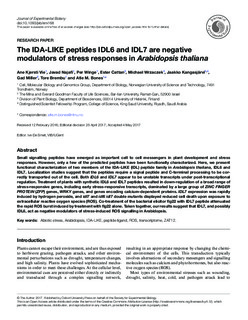The IDA-LIKE peptides IDL6 and IDL7 are negative modulators of stress responses in Arabidopsis thaliana
Vie, Ane Kjersti; Najafi, Javad; Winge, Per; Cattan, Ester; Wrzaczek, Michael; Kangasjärvi, Jakko; Miller, Gad; Brembu, Tore; Bones, Atle M.
Journal article, Peer reviewed
Published version

Åpne
Permanent lenke
http://hdl.handle.net/11250/2450021Utgivelsesdato
2017Metadata
Vis full innførselSamlinger
- Institutt for biologi [2573]
- Publikasjoner fra CRIStin - NTNU [38070]
Originalversjon
10.1093/jxb/erx168Sammendrag
Small signalling peptides have emerged as important cell to cell messengers in plant development and stress responses. However, only a few of the predicted peptides have been functionally characterized. Here, we present functional characterization of two members of the IDA-LIKE (IDL) peptide family in Arabidopsis thaliana, IDL6 and IDL7. Localization studies suggest that the peptides require a signal peptide and C-terminal processing to be correctly transported out of the cell. Both IDL6 and IDL7 appear to be unstable transcripts under post-transcriptional regulation. Treatment of plants with synthetic IDL6 and IDL7 peptides resulted in down-regulation of a broad range of stress-responsive genes, including early stress-responsive transcripts, dominated by a large group of ZINC FINGER PROTEIN (ZFP) genes, WRKY genes, and genes encoding calcium-dependent proteins. IDL7 expression was rapidly induced by hydrogen peroxide, and idl7 and idl6 idl7 double mutants displayed reduced cell death upon exposure to extracellular reactive oxygen species (ROS). Co-treatment of the bacterial elicitor flg22 with IDL7 peptide attenuated the rapid ROS burst induced by treatment with flg22 alone. Taken together, our results suggest that IDL7, and possibly IDL6, act as negative modulators of stress-induced ROS signalling in Arabidopsis.
